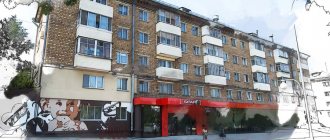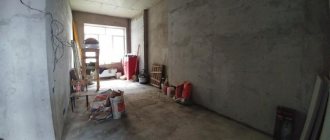Due to the economic stratification of society, people become more creative. Both poor and very rich people choose premises that are not intended for residential use as housing.
Today it is becoming increasingly popular. Non-residential properties appear as a result of business projects and buildings for enterprises. They are bought, rented out, and changed for their intended purpose. Sometimes citizens who have lost their homes are forced to live in such conditions.
The question naturally arises: is it legal to live in non-residential premises? How financially justified is this, is there liability, is it possible to register in such an area - read the answers to these and other questions within the scope of the topic in our article.
Position of the law
Current legislation does not encourage unauthorized settlements in non-residential properties and the unauthorized transfer of non-residential premises to residential ones . However, the owner can stay in the area that belongs to him 24 hours a day, and no one has the right to kick him out.
Even if the surrounding space is not residential. But at the same time, the fact of illegal residence remains, so problems with the law are inevitable.
The lease agreement provides a clause that the premises may be used for a specific purpose. Violation of this clause is grounds for termination of the contract.
Housing legal relations are regulated in our country by the Housing Code of the Russian Federation . Article 15 sets out the basic requirements for residential premises. The list of conditions described therein is exhaustive. This means that the absence of at least one point entails the recognition of the object as unsuitable for habitation.
According to the list described in Art. 15 LCD, residential premises must have the following characteristics:
- to be isolated;
- suitable for permanent residence;
- isolated.
Change houses, carriages, and prefabricated houses are not residential buildings.
Legal regulation of the fact of living in non-residential space is contained in Federal Law No. 52 “On the sanitary and epidemiological welfare of the population.” The ban on settling in non-residential areas and sanitary and epidemiological requirements for residential premises are established in paragraph 2 of Art. 23 of this document.
In a rental property situation, problems can arise between the tenant and the landlord. Often the agreement specifies a clause on the intended use of the premises.
If it was allowed to use the space as a cafe, then it is impossible to set up a mini-hotel in it. The contract may be terminated, and the violator may be held accountable.
When can apartments be used for business?
Residents of the first floors who live in typical high-rise buildings of old buildings usually move their apartments into the non-residential category. When designing them, the possibility of arranging commercial facilities was not taken into account.
With the introduction of amendments to the Housing Code, the process of organizing business activities in apartment buildings has changed. Now it is not enough to contact the relevant structures with an application to change the status of residential premises to non-residential.
Before changing the status of the premises, the property owner must obtain written consent from the owners of adjacent apartments. You will also need permission from the majority of owners of the entrance and house premises. The law does not have retroactive force, but now residents will be able to decide for themselves whether they need another commercial premises.
The innovations will protect owners who bought real estate next to residential ground floors. Later, they were faced with the prospect of living next to an office, store, warehouse, which did not suit them.
The adopted amendments will make life more comfortable for residents of apartment buildings. At the same time, the changes clarify and clarify the rules for commercial activity in high-rise buildings.
Economic stratification in society forces people to become resourceful.
Both excessively rich and excessively poor citizens begin to live where the laws do not provide for this.
Punishments provided for by law
Many people are interested in what will happen if they live in non-residential premises . Not a single legal act prescribes punishment for citizens living in non-residential premises. But the fact of the offense itself is being considered.
In judicial proceedings, paragraphs of Article 6.4 of the Code of Administrative Offenses and articles on sanitary and epidemiological standards of residence are applied.
Citizens who have violated the law on living in non-residential premises must prove only that the premises comply with the regulations, that being in it does not violate sanitary and epidemiological standards and does not disturb the surrounding people.
In practice, it is very difficult to prove the possibility of living in non-residential premises or to obtain official permission from government authorities. The situation can be resolved if the non-residential space is located in a large building.
If Rospotrebnadzor or the Federal Migration Service received a signal about the fact of residence in non-residential premises, the fact of residence was proven, the following fines are provided:
- for ordinary citizens, foreigners - from 500 to 1000 rubles;
- for entrepreneurs - from 1000 to 2000 rubles;
- for enterprises and organizations - from 10 to 20 thousand rubles.
It is possible to pay not only fines, but also a ban on work activities. The maximum period is 90 days.
You can't live
People are usually aware of the illegality of living in non-residential premises. But, according to lawyer Konstantin Egorov, there is no responsibility for this. True, due to the non-residential status, prices for utilities will be higher: there are benefits for housing that are not available for commercial premises.
In addition, in accordance with the Law “On the Sanitary and Epidemiological Welfare of the Population,” non-residential real estate is prohibited from being provided for residential purposes. That is, leasing is illegal and may result in liability. Although usually owners bypass this rule by renting out the premises under a commercial lease agreement.
“If non-residential premises have not been converted to residential status, then you cannot register in it and, accordingly, you cannot formally live. However, the current situation on the market for apartments, which are essentially also non-residential premises, proves that owners are not afraid of the formal status of future housing,” says Alexander Oshurko.
In addition, although legal sanctions are possible, in reality it is very difficult to prove that a person lives in a commercial premises permanently.
1.1. If you just want to do repairs, then you can do it. And if redevelopment is needed, then get permission from the Moscow Intercontinental Committee. I wish you good luck in resolving your issue.
1.2. If you are just going to do repairs, then you can do it. But if reconstruction/redevelopment is not worth it until you get permission.
2.1. Please note Art.
17 of the Housing Code of the Russian Federation, according to which it is allowed to use residential premises for carrying out professional activities or individual entrepreneurial activities by citizens living there legally, if this does not violate the rights and legitimate interests of other citizens, as well as the requirements that the residential premises must meet. As follows from your question, the Tenant is an LLC, which will entail the risk of bringing the Landlord to administrative liability.
In addition, it is not allowed to locate industrial production facilities, hotels, or carry out missionary activities in residential premises, except for the cases provided for in Article 16 of the Federal Law of September 26, 1997 N 125-FZ “On Freedom of Conscience and Religious Associations” . Concluding a lease agreement for a land plot makes sense if the Tenant also uses the land plot itself, and not just the house.
Expert opinion
Kuzmin Ivan Timofeevich
Legal consultant with 6 years of experience. Specializes in the field of civil law. Member of the Bar Association.
3.1. Allowed. The hotel, I wanted to be organized in a non-residential premises. Universal type of permitted use. Will do. But, just in case, also look at the auxiliary types of permitted use.
4.1. these could be different organs, skin or fire supervision, Rostekhnadzor, etc.
5.1. No way. Read for yourself what you are asking: to receive money for non-residential premises from residents. Okay, some “guests” of hotels are placed on individual housing construction for purely commercial use - at least there the housing meets the health standards documented and tourists are called guests. Until the first check in general.
6.1. You need to start with a WRITTEN statement from the administration and receiving a written response from them with LINKS to the law.
7.1. You should have received the documents not after putting the house into operation, but after drawing up the Transfer and Acceptance Certificate. Who handled the paperwork for ownership - you or the developer?
8.1. Lyudmila! Have you received a written response to your requests from any of these authorities? Please clarify. Sincerely, Marina Sergeevna.
8.2. Lyudmila, not everything is so simple. For certain jobs and professions, overnight stays and meals at the workplace are allowed. If your requests are unlawful, no one will satisfy them.
9.1. In practice, questions may arise about proving the fact of residence, and not temporary residence, this time, and that your rights are directly violated by this. These are separate rooms. How exactly were your rights violated?
10.1. Illegal and illiterate.
According to the norms of the housing legislation of the Russian Federation, residential premises, in principle and for formal reasons, cannot be in the non-residential premises of the building.
And it is completely in vain that your officials are trying to protect themselves
from claims of violation of housing rights in this way.
11.1. As long as the decision to transfer to residential premises is not canceled or challenged, there is nothing to worry about. The municipality is reluctant to reverse its own decisions.
Sincerely, Lawyer in Volgograd - Stepanov Vadim Igorevich
.
12.1. To challenge in court, it is necessary to look at the notice and, naturally, the laws of the subject and judicial practice on such issues, then everything will become clear and in perspective.
13.1. It’s better then to look for another construction site, and it’s better for you not to have anything to do with this complex.
13.2. • Hello, There cannot be any full-fledged apartment here, if according to the documents it is not a residential premises, you will not be able to register in it
14.1. In accordance with paragraph 2 of Art.
23 of the Law “On the Sanitary and Epidemiological Welfare of the Population” “Occupancy of residential premises recognized in accordance with the sanitary legislation of the Russian Federation as unsuitable for habitation, as well as the provision to citizens for permanent or temporary
14.2. The Housing Code, in its Article 7, determines that residential premises are intended for the residence of citizens. Accordingly, non-residential premises are used for purposes other than residential housing. Providing non-residential premises for citizens to live in is not permitted by law, since for this it is necessary to convert non-residential premises into residential ones.
I will be glad if the answer to the question was useful.
Expert opinion
Kuzmin Ivan Timofeevich
Legal consultant with 6 years of experience. Specializes in the field of civil law. Member of the Bar Association.
15.1. Victor! You can find out whether an individual entrepreneur or other organization is registered (without your knowledge) at your residential address by sending a request to the Federal Tax Service.
16.1. There is no reason to be afraid. In this case, the Tenant does not engage foreign labor to perform the work, but leases the premises under a civil lease agreement.
16.2. A contract is an agreement between two or more persons to establish, change or terminate civil rights and obligations.
You can draw up an agreement Art. 606 of the Civil Code of the Russian Federation. According to Part 3 of Art. 62 of the Constitution of the Russian Federation Your rights.
17.1. You cannot live permanently in non-residential premises. That is, you cannot officially rent this premises for living. Due to its unsuitability for habitation.
17.2. The technical floor is the common property of all owners of an apartment building. Before exercising your right to hire, contact an attorney in person. What documents are available for the premises? Is there consent from the owners? What confirms the rights of the landlord to this premises?
17.3. If the premises are not residential, you can rent them. Civil Code of the Russian Federation Article 606. Lease agreement Guide to judicial practice (high courts and arbitration courts of districts) under Art. 606 Civil Code of the Russian Federation
Under a lease (property lease) agreement, the lessor (lessor) undertakes to provide the lessee (tenant) with property for a fee for temporary possession and use or for temporary use. The fruits, products and income received by the lessee as a result of the use of the leased property in accordance with the agreement are his property.
18.1. Based on clause 2 of Art. 23 Federal Law No. 52-FZ “On the Sanitary and Epidemiological Welfare of the Population”, the occupancy of residential premises recognized in accordance with the sanitary legislation of the Russian Federation as unsuitable for habitation, as well as the provision of non-residential premises to citizens for permanent or temporary residence, is not allowed.
If a citizen living in a place unsuitable for living rents it, the lessor must bear responsibility: - an individual risks paying a fine from 500 rubles to a thousand (Article 6.4 of the Code of Administrative Offenses of the Russian Federation.)
19.1. The owner of the non-residential premises will not suffer any punishment. Regarding tenants, you just need to draw up a contract correctly. This must be a lease agreement. There is no need to draw up a rental agreement.
20.1. I also occupy a room that used to be a shared kitchen.
These actions are NOT LEGAL!
and you will never be allowed to legitimize this premises, because... These are public places and I do not rule out that you will have problems. Therefore, there can be no question of any documents for registration.
21.1. When designing a garden house under the dacha amnesty, take into account the total area of the attic, veranda, attached toilet with shower, utility room under a common roof with the house, and what category should the residential or non-residential house be classified into if the residence is seasonal? The total area must include all premises adjacent to the house, including residential and utility rooms.
22.1. It all depends on what specific housing and communal services YOU receive. If payment is made for non-existent services, file a complaint with the city housing inspectorate and the prosecutor's office.
23.1. Vera, the tax period is indicated there, and not how long you live there, you may not live on it at all, the tax is calculated based on the fact that the land plot is in your property. Accordingly, you will not be able to resolve the issue of partial payment of tax at all.
Features of registration in non-residential premises
Registration is legally formalized evidence of a citizen’s connection to a specific location . This feature applies only to residential spaces. Registration in non-residential premises is prohibited. This requirement applies equally to both permanent and temporary registration.
In practice, situations occur when citizens register in non-residential premises. But this cannot be done. Officials do not have the right to accept such statements from the public.
It’s paradoxical, but there is no article in the legal acts of our country that would talk about the impossibility of registering in a non-residential property . It seems that you can’t register, but you also can’t get punished for it.
The objects in which registration can be carried out are listed in Art. 1 Appendix to Government Decree No. 713 of July 17, 1995.
Residential housing differs from non-residential housing in that you can register only in the first case. For registration to be legal, non-residential premises must be officially transferred to residential premises. This requirement is contained in Government Decree No. 47 of January 28, 2006.
Is it possible to live in an apartment converted to non-residential premises? To do this, you will need to contact the local municipality, spend a lot of money and fray your nervous system. A specially created commission recognizes the premises as suitable for living. In 2021, this topic is more relevant in relation to country houses.
Is it possible to store things in basements and common areas? And how to turn a basement into a storage room?
The first step is to hold a collective meeting of residents, at which a decision is made on the use of the basement (ground floor) as a place to store residents’ personal belongings. At the same time, all initiators must understand that they will have to invest financially, because any re-equipment will be carried out at the expense of the residents themselves.
If such a decision is made, it is necessary, together with the management company, to prepare a redevelopment plan and obtain permission for redevelopment (for example, in Moscow - from the Moscow Housing Inspectorate).
To draw up a redevelopment plan, it is necessary to conduct an engineering survey of the basement, which will confirm the good condition of communications and the possibility of equipping a separate room for use as a storage room. A redevelopment project can be ordered from a design organization that works with an SRO certificate.
Important!
The process of remodeling a basement is labor-intensive and costly. Therefore, there is a great temptation to unauthorizedly rebuild the basement and use it in the interests of the residents. But you can’t do this! Uncoordinated changes will be easily detected by utility employees. Those responsible will be forced to pay an administrative fine and return the premises to their original appearance.
If you go through the approval procedure and do everything according to the law, you can safely use the new storage rooms without fear that the very first inspection will nullify all your efforts.
Is it possible to register at the dacha
Since 2013, the law has allowed registration in country houses. However, certain conditions must be met. The commissions have certain requirements for such housing:
- presence of a capital foundation;
- absence of mechanical damage in the walls;
- the degree of waterproofing allows you to maintain an inside temperature of 18 degrees and a humidity level of at least 80%;
- compliance with sanitary conditions when installing communication systems;
- compliance with solar lighting standards in interior spaces;
- registration of the object in Rosreestr.
The entire list of items is mandatory to recognize a house as suitable for year-round living. True, this is not enough to obtain registration.
In addition to the requirements for suitability for habitation, the site itself must comply with a number of standards:
- permission to use the land area for gardening has been documented;
- The land plot is located within the boundaries of a populated area.
Registration is prohibited on premises on agricultural lands.
Residential apartment building: use for commercial purposes
A residential apartment building is a building, most of which is occupied by apartments in which people live. In old buildings, apartments on the first floors were mostly transferred to the non-residential category and rebuilt. They are used in commercial activities such as service enterprises and shops.
The legislation allows the transfer of apartments to the category of non-residential and vice versa, approving specific requirements for their operation. The first floors of modern buildings are intended for commercial activities already at the design stage. The premises are provided with display cases, separate entrances, and the ability to connect and use utility networks.
Key points of living in non-residential premises
Some people are wondering if it is possible to live in a non-residential office . Typically, office spaces are equipped with rest rooms. Some organizations have showers and kitchens.
And if an entrepreneur has just started developing his business, living in an office will avoid unnecessary costs. But it is almost impossible to live with a family in such conditions. This option is only relevant for single people.
The comfort of living can be disrupted by unexpected inspections, for example, by firefighters . Fire regulations must be observed in any case. Ignoring them will result in a fine.
It is prohibited to install a gas stove, open heaters and other household items on non-residential squares. In offices, we have to come up with alternative ways of arranging life, how to live in non-residential premises.
It is easier to use a garage for housing than an office . There will be no checks here. And in the box it is possible to provide add-ons with autonomous heating. The main disadvantage is instability. The building may be demolished.
Commercial real estate is more stable in this regard. Apartments, which are not considered residential in domestic legislation, are in no way inferior to expensive apartments.
Are there storage rooms in the basements, but they don’t give you space?
In new housing stock, basements are often immediately equipped in such a way that residents can store their personal belongings in separate rooms. But here you may encounter another difficulty: often new residents do not get a storage room, because “everything has long been distributed among those who moved in earlier.” This is a violation of your rights! All residents have an equal right to use the common property. And if the composition of the residents has changed, the rules by which meters in the basement are distributed may also change.
To achieve justice, it is necessary to initiate a general meeting of residents, and at it to review the conditions for the use of common property. If those previously living in the house contributed their own funds to furnishing the basement, newcomers may be asked to contribute certain amounts.
If an amicable agreement cannot be reached, you can file a complaint with the management company.







